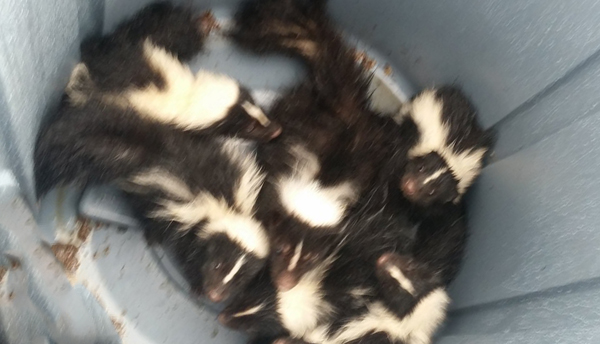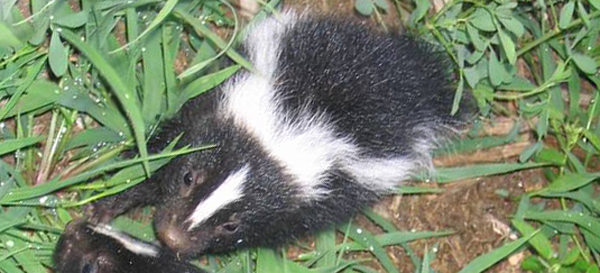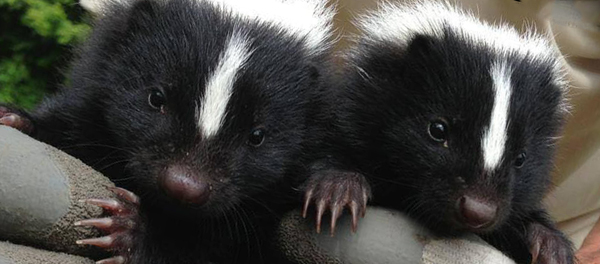- info@wildlife-removal.com
Call us for help in your town
Wildlife Removal Education
What should I do if I find a nest of baby skunks?
Need skunk removal in your hometown? We service over 500 USA locations! Click here to hire us in your town and check prices - updated for year 2020.
If you come upon a nest of baby skunks (kits), do not be quick to conclude that they are abandoned or motherless; their mother could be out foraging for food to eat. And this is especially so at night, as skunks are nocturnal. Watch them for a period of time and try to know the whereabouts of the mother skunk, whether alive or dead.

It is possible that an absent mother skunk is dead – from road kills or predation. Another possibility is that she may have been trapped and relocated from the area without the trapper knowing that it has young kits hidden somewhere.
When this happens, the best way to help the baby skunks to survive is to invite an animal rehabilitator to come and get them. It is in fact unlawful for an untrained person to keep baby skunks unless they acquire a permit to this effect from the appropriate authority. Animal rehabilitators are well trained and experienced in raising vulnerable animals.
Should I feed a baby skunk I found?
What should I do if I find an orphaned baby skunk?
Do Baby Or Juvenile Skunks Spray?
Will A Skunk Have a Nest of Babies Under a Shed or Porch?
How Can Skunks Damage Under Your House?
Best Ways To Remove Skunks From Under Your Shed or Porch
Can Skunks Climb Trees or Fences?
It is very important to call the animal rehabilitators as soon as you sight an abandoned nest because leaving the babies on their own and without adequate care will predispose them to starvation or predation.
Do not attempt to raise baby skunks on your own; they are wild animals and should be handled as such. A lot of people have tried to raise baby skunks as pets on their own and ended up killing them inadvertently. In other cases, individuals would hand the baby skunks over to animal rehabilitators after taking care of them for some time; but they would still die because they have been fed the inappropriate foods and raised the wrong way.
While you wait for the professionals to come and take the baby skunks away, you may provide them with more warmth inside of their nest; find a small enclosed place like a laundry box or cardboard box that can provide enough warmth for them. However, do not give them anything to eat. Kitten food, puppy food or any other pet food should not be given to them as these are not appropriate for skunks. A malnourished baby skunk is likely to soon die from bone problems or diarrhea.
Go back to the Skunk Removal page, or learn tips by reading How to get rid of skunks.
Baby Skunk Removal: Dealing with pest animals is something that homeowners should do promptly if they find that there are animals around their property, as in most cases the animals will only go on to become a greater nuisance if they are allowed to thrive in the area. Skunks are certainly one species that can become a problem, as they are naturally talented scavengers when looking for food, and many of the animals living in suburban and urban areas will have discovered that garbage is a good source of food. This means that if you do find skunks in the area, it is important to catch and remove the animals, but you should also ensure that you check if there are baby skunks to be dealt with too.

Ensuring The Parents Are No Longer Present
In the majority of cases, if you have discovered a nest of baby skunks this means that you will actually have already dealt with the female skunk, either by trapping her or by finding the skunk already deceased either by a road or also sometimes from animal poison. The male doesn’t play a part in raising the young, so if you have caught a male you will not usually have to worry about baby skunks. However, if you do discover a nest of baby skunks without encountering the mother you should back off to a safe distance and monitor the area to ensure the mother doesn’t return within a few hours, otherwise you may have to deal with an angry and protective female skunk.
The Problem Of Baby Skunks Spraying
One thing to note with baby skunks is that they will usually be growing and developing for the first few months of their lives, and when they are young they will not usually have learned to fully control their anal scent glands. This does mean that if you are handling or moving baby skunks, then there is a possibility that they will either try to spray you or accidentally spray you, so this is certainly something you may want to prepare for. Wearing clothes and gloves that you are happy to dispose of is one approach, otherwise you may need to wash your clothes several times to remove the smell of the spray. It is also worth wearing goggles, as the spray can sting and cause problems if it gets into your eyes.
What To Do With The Baby Skunks
If you are not sure about what you should do with the baby skunks, then one of your first calls should be to your animal health department who will be able to advise you about what you can do in terms of transporting them to an animal rehabilitator or in some cases they may have to be euthanized. If you do try to rescue the baby skunks, you should avoid trying to feed them, as the food they receive is very specialized, and in some cases things like cows’ milk given to try and help can actually hurt the little animals.
Finding A Wildlife Rehabilitator And What To Do If They Can Help
There are several directories of wildlife rehabilitators for different parts of the country to be found online, while your local veterinarian should also be able to refer you to a suitable individual who may be able to help. They will then be able to give you guidance about how to keep the animals warm and how to transport them to the rehabilitator. While it may not be possible to save all baby skunks, contacting a wildlife rehabilitator may give them a chance to be raised and then released back into the wild.
How Do Wildlife Rehabilitators Handle Skunks?
Wildlife rehabilitators are professionals that have been trained in the how of caring for wild animals. They are not veterinary doctors, but they do work with them to provide adequate care for skunks and other animals.

Due to the delicate nature of their job, wildlife rehabilitators must have been well trained, and should possess extensive knowledge of wild animals - including their habitats, feeding mode, diets and other vital stuff that will come in useful during their care work.
The first thing a wildlife rehabilitator does to rehabilitate a skunk is to receive the animal and assess its physical condition to determine what actually is wrong with it.
In the case of orphaned baby skunks, the animal rehabilitator provides food, warmth and shelter for the skunk. They know the right feed formula to give the little kit for it to survive and flourish. It is in fact, different from pet formulas. The ultimate goal of rehabilitating a distressed skunk is for its later release into the wild to play its part in the ecosysytem.
With the help of veterinary doctors, they restore injured and sick skunks, whether it be diarrhoea, bone disorder, or any other developmental problem.
After extensive care must have been given to the orphaned, injured or sick skunk, as the case may be, it is then prepared for re-entry into the wild. The animal is introduced to a large, outdoor environment which resembles its natural habitat. Here, the response of the skunk will be studied to determine its readiness and capability to survive out in the woodlands. If its response is good and encouraging, the animal gets released into the wild by the personnel, or it is retained for a longer period until it is ready to go.
If an injured skunk is treated but does not respond well to treatment and shows signs of not being able to live a normal life on its own, the wildlife rehabilitator may on rare occasions, introduce it to a special facility where the animal will be trained and kept for the rest of its life. In the alternative, its life may be terminated humanely by euthanization. This is because it is inhumane to release an opossum into the wild when it is obviously going to be preyed on cruelly.
Orphaned skunks can also be euthanized if they have been massively malnourished and cannot live on their own without a caregiver.
Go back to the Skunk Removal page.


















